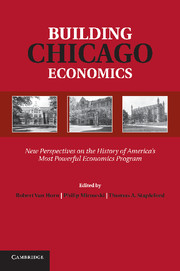 Building Chicago Economics
Building Chicago Economics from Part Four - Debating “Chicago Neoliberalism”
Published online by Cambridge University Press: 05 November 2011
During my whole career, I have considered myself somewhat of a schizophrenic, which might be a universal characteristic. On the one hand, I was interested in science qua science, and I have tried – successfully I hope – not to let my ideological viewpoints contaminate my scientific work. On the other, I felt deeply concerned with the course of events and I wanted to influence them so as to enhance human freedom. Luckily, these two aspects of my interests appeared to me as perfectly compatible.
– Milton Friedman , 189Like most of his peers, Milton Friedman (, 4) confidently claimed that he was able to prevent his political beliefs from interfering with his scientific practice. In so doing, he indeed gained the respect of many including political adversaries: “Even those who, like myself, often find themselves in basic political disagreements with him, must greatly admire and indeed envy his fearless and penetrating insight of the deepest roots of economic issues. He has done more directly and indirectly, to train economists in rigorous thinking and in the uncovering of common prejudices than any other teacher in many decades,” wrote Keynesian economist Abba Lerner to the Nobel Prize committee in 1976. This strict separation between science and politics was taken for granted by some historians of the Chicago School such as Van Overtveldt , allowing them to focus exclusively on the internal reasons for the success of the Chicago School – excellence and debate culture, mastering of neoclassical price theory, and importance of empirical work.
Judging from the stir created by the reception of the Bank of Sweden Prize in Economic Science by Friedman, however, it seems that a number of economists were not convinced by Lerner’s statement, nor would they agree with Van Overtveldt’s history. There was strong suspicion that the consistency between Friedman’s market-oriented microeconomics and his antistatist political recommendations was not merely accidental. His macroeconomic work has similarly been interpreted as an attempt to shatter the pillars of American Keynesianism, an attack realized at the expense of reliable theoretical and empirical foundations. On the side of historians of economics and economic methodologists, Friedman’s work has been described as an idealized view of the free-market system and as a positive rationalization of his political convictions (Samuels , 7–13 and 363–395; Nelson ; Lavoie and Seccareccia , 16). Familiar with the Marx-Mannheim critique of economics, those critics were concerned with hunting down the ideological dimension of economic science. Though the Marxist concept of “ideology” has gradually been replaced by references to vision, paradigms, ethics, or value judgments, the idea remains the same – the economist is influenced by his social status and his political beliefs, and economic theories are not only designed to explain the world, but also to support group interests and legitimize particular courses of actions (see, for instance, Amadae ). In this vein, Robert Van Horn and Philip Mirowski , by uncovering the links between some Chicago projects, the establishment of the Mont Pèlerin Society (hereafter MPS), and their funding by conservative organizations, have recently argued that “the rise of the Chicago School must be understood as one component of a specific larger transnational project of innovating doctrines of neoliberalism for the postwar world” (140).
To save this book to your Kindle, first ensure [email protected] is added to your Approved Personal Document E-mail List under your Personal Document Settings on the Manage Your Content and Devices page of your Amazon account. Then enter the ‘name’ part of your Kindle email address below. Find out more about saving to your Kindle.
Note you can select to save to either the @free.kindle.com or @kindle.com variations. ‘@free.kindle.com’ emails are free but can only be saved to your device when it is connected to wi-fi. ‘@kindle.com’ emails can be delivered even when you are not connected to wi-fi, but note that service fees apply.
Find out more about the Kindle Personal Document Service.
To save content items to your account, please confirm that you agree to abide by our usage policies. If this is the first time you use this feature, you will be asked to authorise Cambridge Core to connect with your account. Find out more about saving content to Dropbox.
To save content items to your account, please confirm that you agree to abide by our usage policies. If this is the first time you use this feature, you will be asked to authorise Cambridge Core to connect with your account. Find out more about saving content to Google Drive.